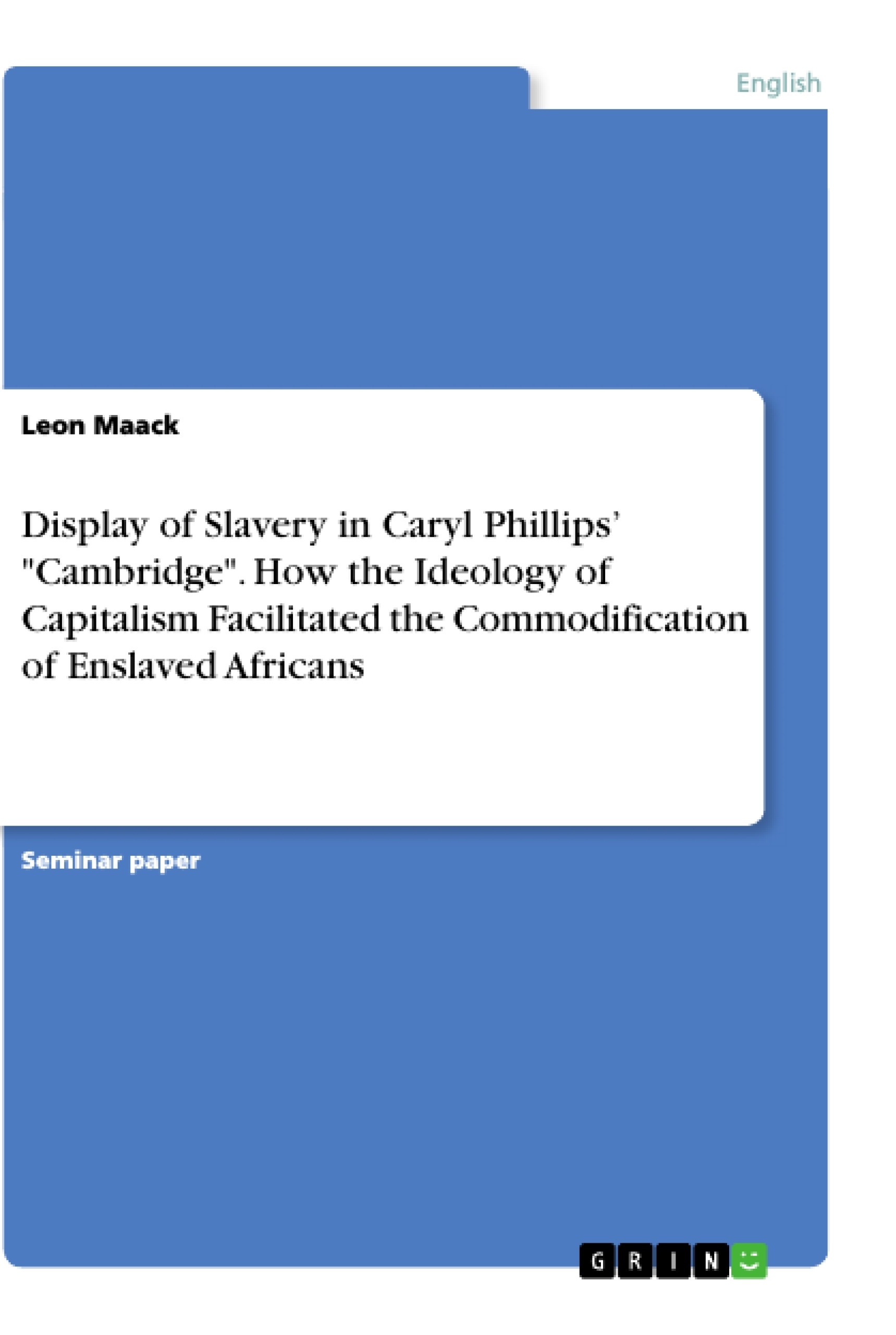The aim of this paper is to answer the following questions: What role did the emerging system of capitalism play in the dehumanizing and enslavement of people of African origin from the 16th century onward? What impact did its ideology have on the lives and thoughts of the main characters in Caryl Phillips’ "Cambridge"?
Caryl Phillips’ 1991 novel "Cambridge" shines a light on the harsh realities of slave labour on plantations in the West-Indian colonies. The practice of slavery itself has not been historically new when the transatlantic slave trade took off in the 16th century. This enterprise, however, gave rise to slavery as an institution of unprecedented magnitudes and brutality and would later prove to have colossal ramifications for the African continent and its future development.
An institution like that of slavery could not exist if it weren’t for an ideology supporting it. The crucial aspect that ultimately distinguished this new kind of slavery from indigenous forms of servitude was capital. The mechanisms constituting this enterprise can be attributed to the rising cultural systems of capitalism and consumer culture, exploiting cheap labour to satisfy the demand for foreign goods such as sugar in European societies.
Trading and exploiting African people came to be understood as a business venture, degrading human beings to a mere commodity and means of production, owned by businessmen such as the father of one of "Cambridge"'s main characters, Emily Cartwright. Her experiences and her thoughts on the enslaved people working on the unnamed Caribbean Island home to her father’s estate give insight into the racist perception of black people in distant Europe.
In contrast, the reader gets to see the cruelties of slavery through the eyes of the novel’s namesake, Cambridge. Together, these completely distinct perspectives create a profound image of slavery as an institution, the capitalist forces behind it as well as the prejudices necessary to facilitate and maintain this atrocious enterprise.
Inhaltsverzeichnis (Table of Contents)
- Introduction
- Chapter I: How institutionalised slavery was made possible
- Chapter II: The ideologies presented by Emily Cartwright and Cambridge 8
- Conclusion
Zielsetzung und Themenschwerpunkte (Objectives and Key Themes)
This research paper explores the role of capitalism in facilitating the commodification and enslavement of Africans, particularly focusing on Caryl Phillips' novel Cambridge. It examines how the ideology of capitalism contributed to the dehumanization and exploitation of enslaved individuals.
- The role of capitalism in the transatlantic slave trade and its impact on enslaved people.
- The ideologies and perspectives of both those who benefited from and those who suffered under slavery.
- The use of historical documents and narratives to provide insights into the realities of slavery.
- The construction of racial superiority and the justification of slavery through capitalist ideology.
- The enduring legacy of slavery and its influence on modern societies.
Zusammenfassung der Kapitel (Chapter Summaries)
- Introduction: This chapter introduces the central theme of the paper, exploring the relationship between capitalism and the enslavement of Africans, and how this is portrayed in Caryl Phillips' novel Cambridge. It highlights the dehumanizing aspect of slavery and the crucial role of capital in its development.
- Chapter I: How institutionalised slavery was made possible: This chapter delves into the historical context and ideologies that supported the institution of slavery. It examines how historical documents and narratives, incorporated into the novel, provide insights into the realities of plantation labor and the racist perspectives prevalent at the time. The chapter also explores the role of capitalist ideology in shaping the views and actions of both the enslaved and the enslavers.
Schlüsselwörter (Keywords)
This research paper focuses on the intersection of capitalism, slavery, and racial ideology. It analyzes the impact of the transatlantic slave trade on African people, examining the dehumanizing effects of commodification and the role of capitalist ideology in perpetuating these practices. Key concepts explored include the historical context of slavery, the perspectives of both enslaved and enslavers, the use of historical narratives, and the enduring legacy of slavery in shaping contemporary societies.
- Quote paper
- Leon Maack (Author), 2020, Display of Slavery in Caryl Phillips’ "Cambridge". How the Ideology of Capitalism Facilitated the Commodification of Enslaved Africans, Munich, GRIN Verlag, https://www.grin.com/document/985865




